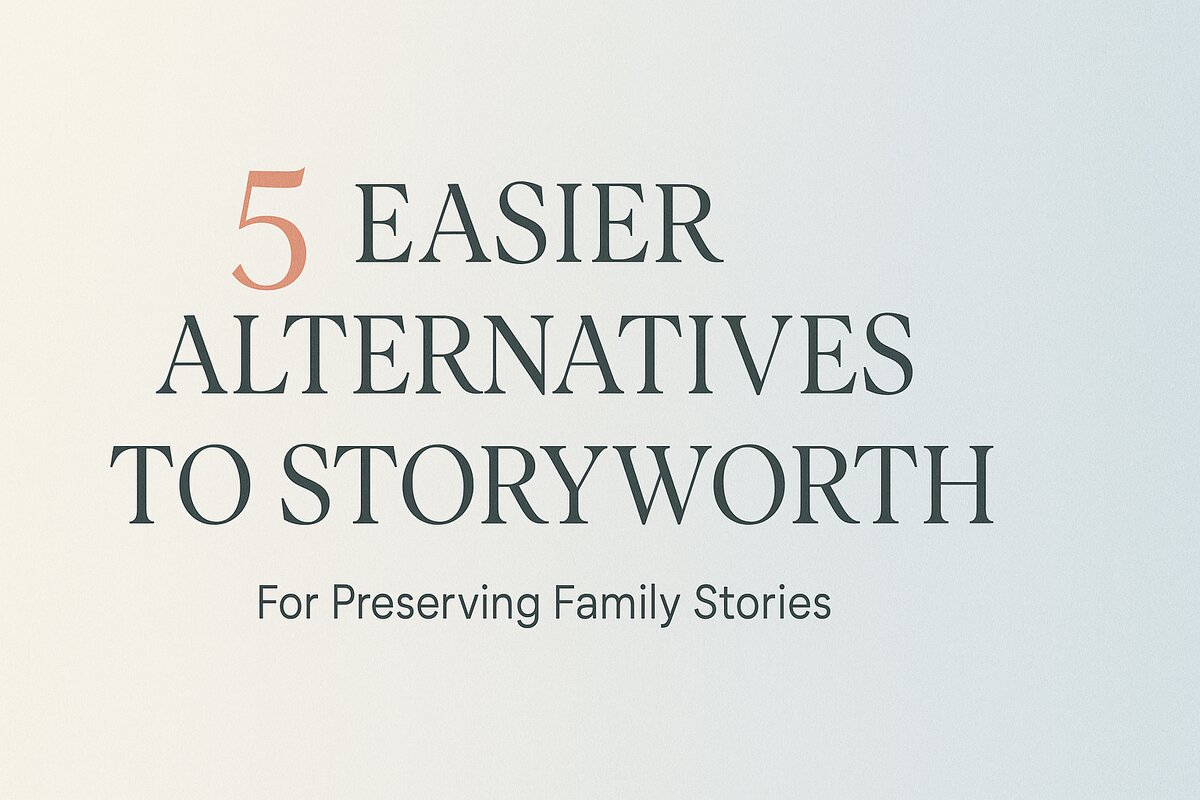Introduction
Preserving your family's stories is one of the most meaningful gifts you can give to future generations. Services like
Storyworth
have done a wonderful job of bringing this idea into the mainstream, prompting families to start the important work of recording their history. The concept is simple and beautiful: email a question once a week, and at the end of the year, the compiled answers are turned into a book.
But for many, there's a practical hurdle. The process relies heavily on one person's willingness and ability to sit down and write. For older parents or grandparents who aren't comfortable with computers, suffer from arthritis, or simply find typing long stories to be a daunting chore, the project can stall before it even begins.
If you've found yourself thinking, "This is a great idea, but my mom will never type all that," you are not alone. The good news is that a growing number of innovative
services for preserving family history
have emerged to solve this exact problem. This guide will provide a comprehensive look at the best and easier alternatives to Storyworth, focusing on methods that prioritize conversation over composition and make the experience joyful and effortless for your loved one.
Understanding the "Storyworth Challenge": Why a Different Approach Might Be Needed
While Storyworth is a fantastic tool for the right person, its effectiveness hinges on the storyteller's comfort with technology and writing. If you're looking for Storyworth alternatives for documenting family memories, you likely recognize one of these common challenges:
-
The Typing Barrier:
Many individuals from older generations did not spend their careers typing on keyboards. The physical act of typing out detailed, multi-paragraph memories every week can be slow, frustrating, and even physically painful.
-
Tech Fatigue:
For some seniors, the process of finding an email, clicking a link, logging into a platform, and using a text editor is a significant technological barrier. Simplicity is key.
-
The Pressure to "Write":
Staring at a blank page can be intimidating. The pressure to write well, with perfect grammar and a clear narrative, can cause some people to procrastinate or give short, uninspired answers. A natural conversation often yields richer, more detailed stories.
-
Lack of Spontaneity:
While the prompts are excellent, the asynchronous nature of email can feel less personal and spontaneous than a real conversation, where follow-up questions can be asked in the moment.
Recognizing these barriers is the first step toward finding a solution that fits your family's unique needs. The goal is to make sharing memories a pleasure, not a project.
The 5 Best Alternatives to StoryWorth in 2025
We've tested and reviewed dozens of services to bring you this updated
alternatives to StoryWorth family memory services list
for 2025. These services prioritize ease of use for elderly parents, using phone calls, voice recordings, and smart technology to eliminate the typing burden.
1. Tell Mel: The AI Biographer on the Phone
For families seeking the most effortless and personal experience,
Tell Mel
stands out by using a sophisticated AI to conduct full, natural conversations entirely over the phone. It's designed to feel less like an interview and more like a friendly chat, making it an incredibly accessible and easier alternative to Storyworth.
-
How It Works:
Tell Mel is a full AI biographer who calls your loved one for scheduled phone conversations. Instead of static prompts, the AI engages in deep, empathetic dialogue, asking thoughtful follow-up questions that help draw out detailed stories. Many users report that their loved ones think of the AI, Mel, as a friend. After each conversation, the spoken words are transformed into beautifully written memoir chapters.
-
Why It's Easier:
-
Full Conversations, Not Just Prompts:
Its key strength is its ability to have a real, back-and-forth conversation. This dynamic approach is perfect for getting stories out of people who might be hesitant or who don't respond well to simple prompts.
-
Completely Phone-Based:
The entire experience happens on a regular phone call. There are no apps, no logins, and no typing, making it the ideal solution for those who are not tech-savvy. This is why many people turn to Tell Mel after finding Storyworth too labor-intensive for their family members.
-
Multilingual Support:
Tell Mel can conduct conversations in 10 different languages and then deliver the final written memoir in English, breaking down language barriers within families.
Tell Mel is designed for those who want to capture the richest, most authentic stories from their loved ones with zero technical burden on the storyteller.
2. Remento: Voice Recording with Smart Prompts
Remento
takes a hybrid approach, combining the prompt-based system with voice recordings instead of typing. Updated in 2025 with improved AI transcription.
-
How It Works:
Remento sends weekly prompts via email or text. Your parent then records their answer by speaking into their phone.
Important note:
This is not a conversation - it's just a prompt followed by silence while your parent talks alone. There are no follow-up questions or interaction to help draw out stories.
-
Pricing:
Starting at $99/year for the digital version, $149 for a hardcover book included.
-
Pros:
No typing required, maintains the weekly prompt structure many families like, recently added QR code feature for sharing recordings.
-
Cons:
Lacks conversational element - just prompts followed by recording in isolation. Many seniors find talking alone to a device uncomfortable. Still requires tech interaction, and transcription quality can vary with accents or background noise.
3. LifeBio: Professional Phone Interviews
LifeBio
offers professional phone interview services where trained interviewers call your parent to capture their stories. Perfect for those who want a human touch.
-
How It Works:
A professional interviewer schedules phone calls with your parent, using structured questions to guide the conversation. Sessions are recorded, transcribed, and compiled into a life story book.
-
Pricing:
Phone interview packages range from $429 (2-hour interview) to $699 (4-hour interview) including the final book.
-
Pros:
Professional human interviewers, no technology needed for parents, structured approach ensures comprehensive coverage.
-
Cons:
More expensive than other options, limited to pre-selected questions, less flexibility than conversational AI.
4. Storii: Automated Phone Call Interviews
Storii
offers an automated phone interview system that calls your parent weekly to ask questions and record their answers.
-
How It Works:
Storii calls your parent on their regular phone at scheduled times. An automated voice asks pre-selected questions, and your parent's spoken answers are recorded. The recordings are transcribed and can be compiled into a book.
-
Pricing:
$19/month for the basic plan, $39/month for premium with book creation included.
-
Pros:
No technology needed - just answer the phone. Regular schedule helps build storytelling habit. Affordable monthly pricing.
-
Cons:
Automated voice can feel impersonal. No follow-up questions or conversation. Some seniors find it awkward talking to a robot voice.
5. Artifact: Photo-Driven Story Collection
Artifact
takes a unique approach by using family photos as the foundation for story collection, making it easier for seniors to remember and share memories.
-
How It Works:
Upload family photos to Artifact, then invite your parent to add voice recordings or text stories to each photo. The visual prompts help trigger memories naturally. Creates a digital scrapbook combining images with stories.
-
Pricing:
Free for basic features, $9.99/month for premium with unlimited storage and book printing options.
-
Pros:
Photos help spark memories naturally. Can be collaborative - multiple family members can add stories. Modern, user-friendly interface.
-
Cons:
Still requires some tech use (though minimal). Works best if you already have digitized photos. Not ideal for capturing life stories without photo prompts.
Your Phone's Voice Recorder
The most basic tool is the voice memo app on your smartphone.
- Pros: It's readily available and completely free.
-
Cons:
This is the ultimate DIY method. The audio quality can be inconsistent, and it leaves you with a raw audio file that requires hours of transcription and editing to become a readable story or a polished, user-friendly family memory book.
Conclusion: Preserving Your Legacy Should Be a Joy, Not a Chore
Every family has a unique story to tell, and the process of capturing it should be as beautiful as the memories themselves. While Storyworth opened the door for many, the landscape has evolved to offer more inclusive and accessible options.
The key takeaway is that you can—and should—choose a method that fits your family's personality and technical comfort level.
Easier alternatives to Storyworth
are available, and they work by shifting the effort away from the storyteller and onto clever technology or professional services.
To start your journey:
-
For the most natural and effortless experience, especially for hesitant or non-English speaking relatives, consider a conversational AI service like Tell Mel.
-
For a structured interview process with clear packages, look into LifeBio.
-
To create a unique book that links written words to audio recordings, explore Remento.
-
To preserve your existing library of physical media, start with a digitization service like EverPresent.
The most important step is to begin. Don't let the fear of typing or technology stand in the way of preserving a priceless legacy. Choose the path that feels most natural and joyful, and start capturing those incredible stories today.



